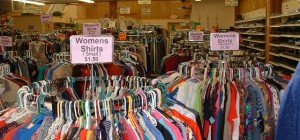My wife and I were visiting a small town in Georgia once and asked one of the locals “where the thrift stores were?”
She looked at us as if we had something fishy going on…and then said, “You mean where the poor people shop?”.
We are into thrift stores. There aren’t many that we pass up. We’ve got to check them out.
Big cities, small towns…we check all their thrift stores out. There isn’t much that gets the “OK” for a diversion more often than a thrift store we’ve never visited before.
In all our thrift store visiting, it hit me that a pretty strong indication of how well an area was doing could be found in their thrift stores. We live in a land of plenty. No matter what the media tells us about how the economy is doing, in the area of material goods we really do excel. The purest example of a consumerist society is on display when you go to a store that sells the “cast offs” at the tail end of a product’s utility. We go through a lot of product. An area that can support a number of thrift stores is usually doing pretty well financially…or at least is an area that’s pretty good at consuming.
What I’ve found to be true is that thrift stores really do mirror what’s going on in a community. Places that have a lot of people, consume a lot of material goods, and that have a high turnover in the goods that they do buy tend to have the best thrift stores. It’s not just the “worn out” that makes it to the thrift stores, either. It’s often the stuff that has to be “moved out” to make way for the new. Check out a thrift store around the first of the new year…you’ll probably find some items that were replaced at Christmas.
The lady’s comments about “poor people” is really kind of funny when you dig a little deeper into who is doing a lot of the thrift store purchasing. Many of the people we see in thrift stores these days are dealers. People with smart phones scanning the book section to see what might be salable , others checking labels to see what might have potential on Ebay, and all of them seeing how they can use the low end supplier to make a profit. Prices at the thrift stores have gone up as a result…but like any business the “bottom line” is making sales, not necessarily only selling to the “poor people”. It is strange to watch all this play out. Thrift stores are popular with a pretty broad range of people for a lot of reasons…the fact that items can be researched almost instantaneously takes a lot of the “magic” out of shopping like this…but makes it easier for the dealers to run a business. When it became easy to research and buy and sell, you saw a whole lot of people get into the thrift store market. When a business that was set up to give the lower income folks an alternative to retail is hit hard by people recognizing that low prices equal a better profit margin you really have to wonder who the business is serving.
I’m a big fan of the second-hand market. My father once called me a “good scrounger”. I guess it kind of hurt my feelings a little…never really thought of myself as a scrounger…but I suppose that we are pretty good at supplying our needs with “recycled” items. There are a lot of ways to be green. A person can buy the brand new, organic cotton, hand sewn shirt from the fair trade store in the trendiest section of the hippest town…or maybe just buy a used “recycled” flannel shirt from the thrift store. I guess it all works out in the end.

I definitely agree with you that the perception that resale is for “poor people” isn’t an accurate one. I consider it a green initiative. Although, one stroll through ANY resale store ANYWHERE in the US and you realize we definitely make and consume too much stuff. Goodwill even has outlets, a strange thought when you realize our second hand stores need overstock.